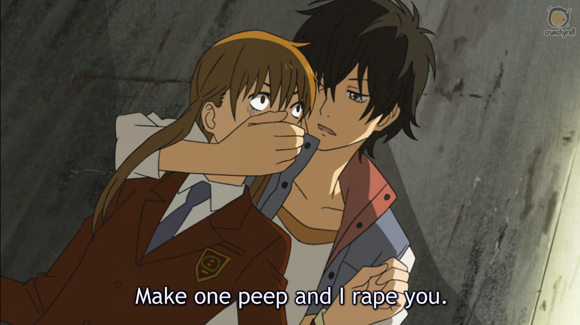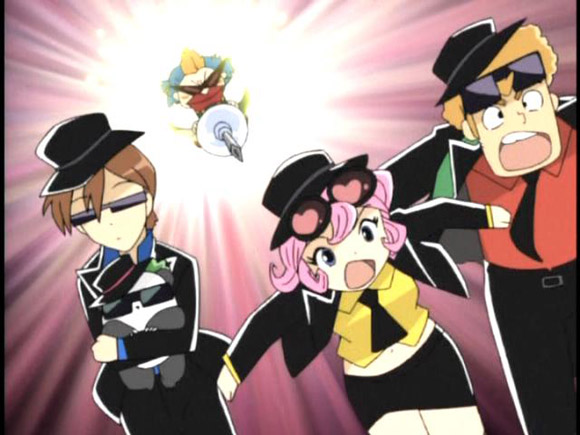One of the things you don’t think about before you get engaged is how different the holidays will be. I’ve been traveling ever since my birthday, but luckily always to someplace with a wifi connection. To stay relaxed through it all, I’ve been powering through one of the Fall 2012 season’s most popular shows, My Little Monster.
For the uninitiated, My Little Monster is the story of a studious girl and the irreverent but violent delinquent she reluctantly falls in love with.
As you might expect, domestic violence is a heavily hinted underlying theme of this show. In fact, the reason I decided to pick it up was when I heard the male main character, Haru, threatens to rape main female character Shizuku in the very first episode. Readers who know me as one half of the Sexism in Anime Fandom panel might be scratching their heads right now.
Like I said in the panel though, having issues with sexism in some anime doesn’t mean we need to stop watching all anime, or even all possibly sexist anime. I believe that it’s important to remain an active consumer of anime in order for my opinion to be at all relevant to creators. As I told Goboiano:
Basically, we anime fans talk with our dollars. We need to show licensors not only that we’re paying customers, but what we will and will not put up with. So if we buy a show and think it’s sexist, we should say that. “I bought this show and I didn’t like X.” It certainly worked for hundreds of thousands of unhappy Mass Effect 3 customers, who got the actual ending of the game changed by buying it and then being dissatisfied.
If an anime is problematic and your response is to boycott it, licensors have no incentive to change because you’re not a paying customer anyway.
So, back to My Little Monster, AKA girl meets psychopath. In any other context, Haru would be a man any woman in her right mind ought to back away from, taser at the ready. But at every opportunity, his sociopathic behavior is played for jokes and tempered with cuteness. Scary: he doesn’t want a girl to leave him, so he declares a desire to tear off her arms and legs. Cute: he has a pet chicken he brings to school! Scary: he puts a girl in a chokehold with hardly any provocation. Cute: he trusts other people’s good intentions to a fault. Haru’s impulsive behavior is made to seem childish, just a phase, just “boys will be boys.”
It helps to alleviate the threat when Shizuku, isn’t having any of it. When Haru tries to control her by forbidding her to go to cram school or speak to a rival, Shizuku barks, “You can’t tell me what to do!” Shizuku’s mere presence can also keep Haru from having a violent episode. She’s not afraid to stand up to him or put him in his place, making him seem less harmful than he really is.
Thanks to this dynamic, My Little Monster sets a dangerous example for romantic relationships. It teaches that the right girl, with love and tenderness, can reform a violent boy. It implies that anyone with violent tendencies has a good heart underneath, and will respond to reason.
There’s just one problem with my argument. I can’t stop watching.
I may have issues with some of the characters’ relations, but I love how their personalities break the shoujo mold. There are plenty of cute moments, and an interesting, up-tempo pace. I’ll be looking forward to how it ends, and I won’t feel like a hypocrite for doing so.
Basically, if I vowed to stop watching any show with sexist elements, I’d have to quit watching American TV, too, and probably most commercials. It’s a big problem that won’t go away overnight, or probably even in my lifetime. The solution isn’t to quit on shows, but to educate yourself to recognize problematic themes when you see them.
It bothers me that Haru’s violence is being played as a personality quirk, but I’m glad I’m able to make that assessment. And since most girls growing up today are taught to be adequately scared of men, I am confident adult viewers can separate this impossible fiction from a potentially dark reality.
My Little Monster is the seventh most popular show on Crunchyroll right now. Are you watching it? What do you think?







